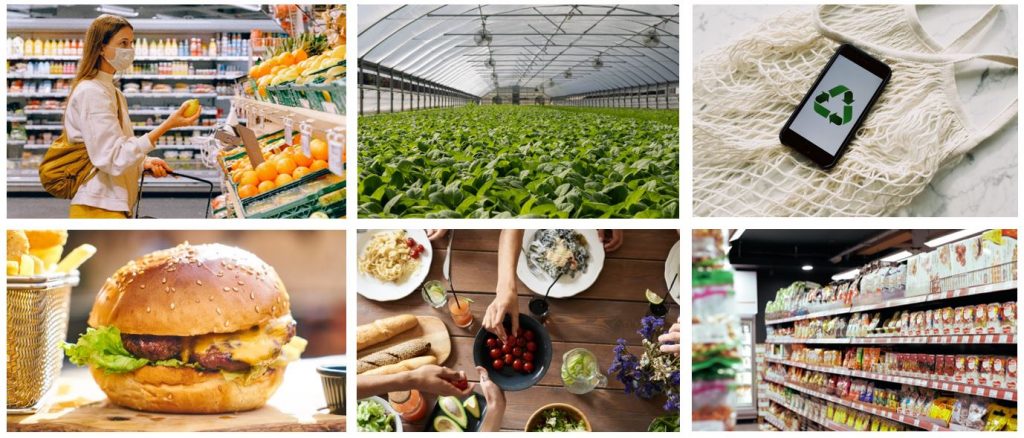The food sector considers sustainability important but thinks their own sustainability can be achieved quicker
July 29, 2021

Research by Omnicom PR Group offers insight into sustainable business operations and the role of communication
Why is one food producer becoming more sustainable faster than the other and who, or what, influences this? It was the central question that grew among the Food & Agri specialists at Omnicom PR Group during the past months. To formulate answers and concrete advice in response to this question, we published unique research in the food sector. Via a survey, 282 directors, managers and staff members of Dutch food producers were asked about the meaning of sustainability and the role of communication within their own company*.
Mid-level drivers in sustainability
A striking first insight from the survey is that the majority of Dutch food producers (53%) see themselves as ‘average’ when it comes to actual sustainability practices. More than a quarter even say that their own company is lagging behind. This is in contrast to the communication about sustainability, according to Jeannot Waaifoort, Business Director Food & Agri at Omnicom PR Group. “We see that people are generally very satisfied with the sustainability communication of their own company. 73% of the respondents indicate that they consider sustainability important. On the other hand, they still see themselves as average when it comes to actual sustainability,” says Waaifoort.
CEO: vision versus exemplary behavior
The difference between communication and actual behavior can also be seen at the CEO level. Waaifoort: “It is striking that half of the respondents believe that the CEO conveys an inspiring, credible vision. However, only 38% believe that the CEO propagates this vision with concrete exemplary behavior. We believe that this is an opportunity for CEOs to boost their vision on sustainability even more clearly internally, to make it more concrete, and to demonstrate in concrete actions. OPRG is therefore conducting a follow-up study to provide CEOs with useful tips in this regard.”
Tangible sustainability aspects
In addition, the research shows that the definition of ‘sustainability’ is broad and fragmented within the food sector. 40% of the respondents mentioned recyclable packaging and less waste as the most important sustainability aspects. In contrast, sustainability aspects such as local and fresh products, supporting local communities and less international transport are placed at the bottom of the list of important sustainability aspects in the survey with less than 10%. Setting up a sustainable food chain as a whole is also rarely mentioned as an important aspect, while these are subjects that receive a great deal of attention in the media and the social debate. This shows that the sustainability approach is more successful at food companies if it is tangible and easy to communicate.

Providing information helps accelerate policy
Based on the results of the survey, Omnicom PR Group also looked at the balance between communication about sustainability and the actual policy of food companies. Respondents indicated that their own sustainability policy can be further accelerated, with 70% stating that information provision and communication can help. Waaifoort agrees: “By making smart use of internal and external communication about the sustainability policy, at the right time, to the most relevant influencers, you can help to stimulate, interpret and strengthen sustainability. It gets the conversation going, internally and externally, and can help to activate and motivate sustainability influencers and stakeholders. I even believe that good communication can be a catalyst for sustainability.”
Mission for communication
According to the Food & Agri specialists at Omnicom PR Group, there is a clear mission for communication departments, managers and advisers. This summer Omnicom PR Group is therefore organizing roundtable discussions on this topic, where food production managers and specialists will exchange experiences about influencers of sustainability. Everything from the point of view of communication and reputation. Waaifoort: “We try to map the most important influencers of sustainability as a whole, not to make a value judgment, but to provide a coherent insight into the complex factors that play a role in the speed of sustainability policy.”
In the autumn, all the results of the research and the round table discussions will be mapped out. On this basis, concrete conclusions and recommendations will be formulated that Dutch food producers can use. Stay tuned!
Want to know more or participate?
Read what Levensmiddelenkrant wrote about our research on pages 1, 2, and 3 (Dutch).
For questions about the research results or if you are interested in participating in the roundtable discussions please send a message to:
- Jeannot Waaifoort, Business Director and Partner at Omnicom PR Group, [email protected]
- Nina Boot, Business Director at Omnicom PR Group, [email protected]
* Survey commissioned by Omnicom PR Group by DVJ Insights in February/March 2021 among 282 directors, managers, and staff members working within food producing companies in the Netherlands.